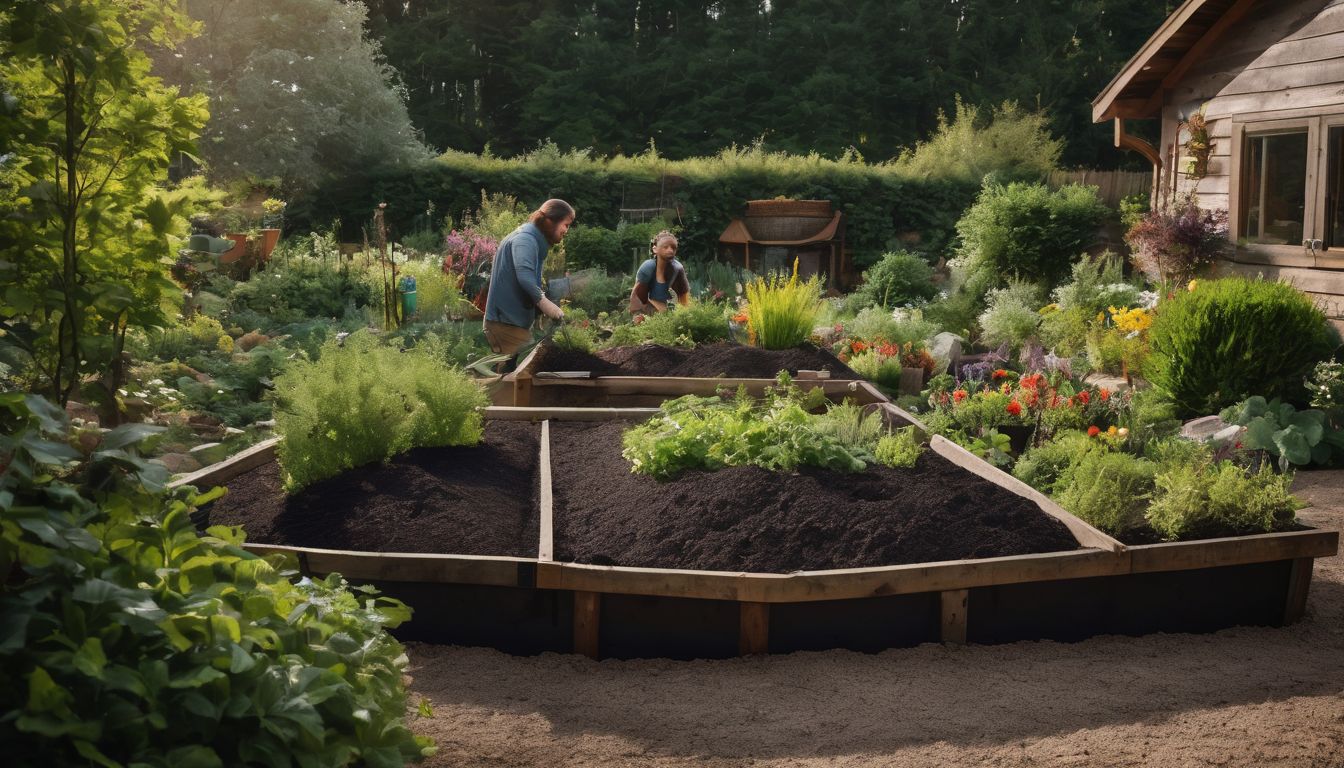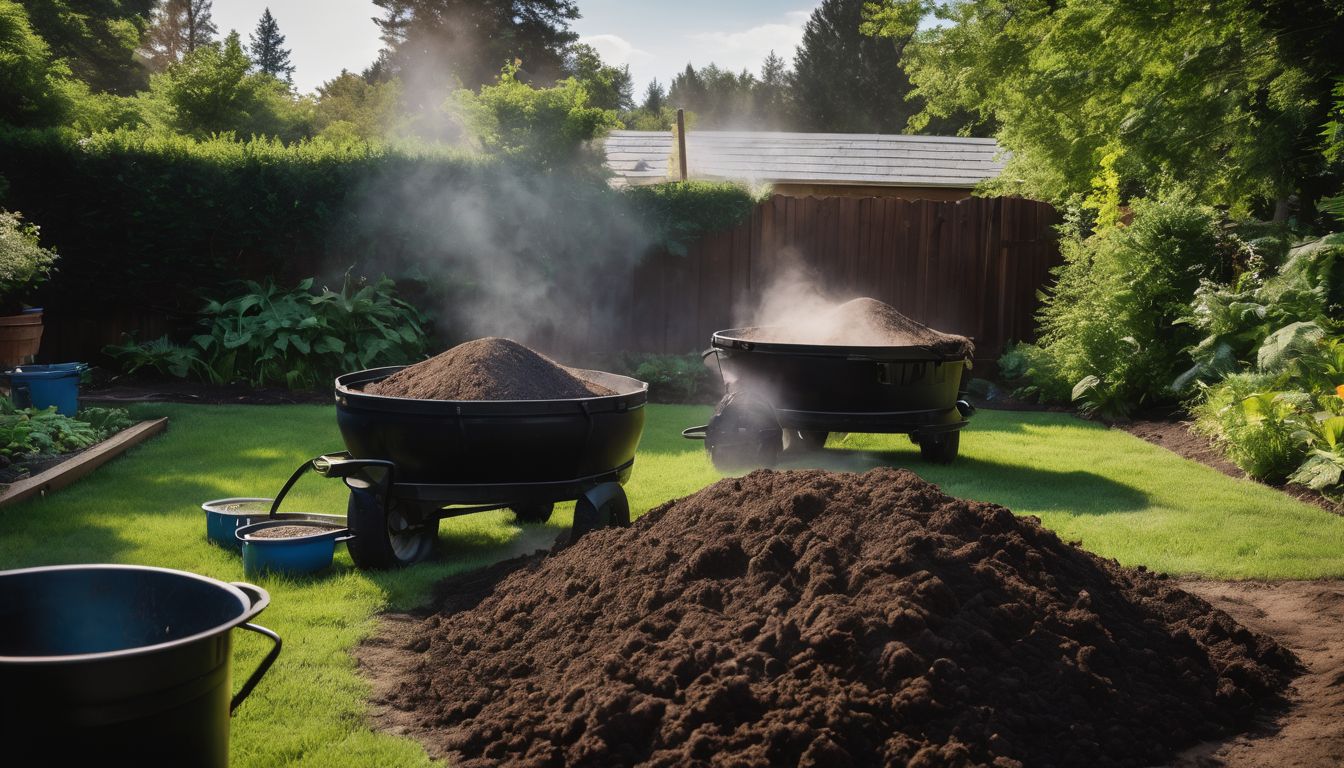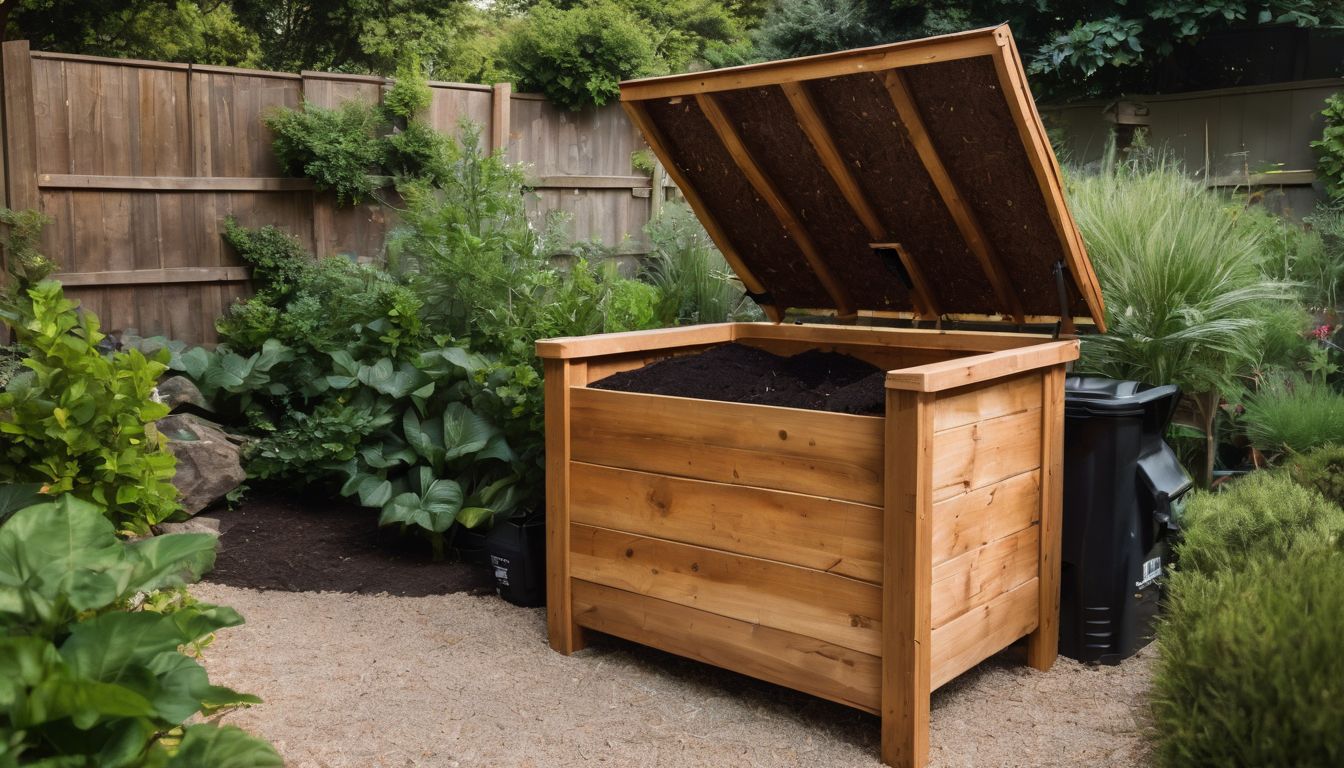Are your plants looking a bit under the weather? Compost tea could be your garden’s secret weapon, packed with nutrients and beneficial microorganisms. This article will guide you through brewing your own compost tea to boost soil health and give your greens the upper hand.
Read on for greener gardens!
Key Takeaways
- Compost tea is a liquid fertiliser made by steeping nutrient-rich compost in water, which infuses soil and plants with beneficial bacteria and fungi for healthier growth.
- Applying compost tea to your garden can boost plant resilience against diseases and pests while reducing the need for chemical pesticides, supporting sustainable agriculture practices.
- Make sure to use dechlorinated water and clean equipment when brewing compost tea to avoid killing beneficial microorganisms or introducing harmful pathogens into the mix.
- There are two methods to brew compost tea: aerated, which uses an air pump to encourage microbial growth; and non-aerated, where the mixture steeps without added oxygen.
- You can apply compost tea directly to the soil around plant roots or as a foliar spray on leaves; both methods improve plant health by providing nutrients and enhancing natural defences.
What Is Compost Tea?
Delving deeper into the world of natural gardening, compost tea emerges as a liquid fertiliser that’s steeped in sustainability. This nutrient-rich brew is made by steeping finished compost in water, extracting valuable microorganisms and nutrients that help plants flourish.
It’s like making a giant cup of tea but for your garden; instead of tea leaves, you have decomposed organic matter teeming with life.
Compost tea infuses soil and plants with beneficial bacteria and fungi, boosting their health and resilience. These tiny helpers form a living connection between the roots and the nutrients they need, creating an environment where plants can thrive organically.
Gardeners cheer this eco-friendly concoction because it links traditional compost benefits with ease-of-use while encouraging robust plant growth without chemical inputs.
Benefits of Using Compost Tea
Using compost tea improves plant growth and health, while also preventing pest and disease infestations.
Improves plant growth and health
Compost tea provides essential nutrients to plants, promoting robust growth and overall health. The microbial activity present in compost tea aids in breaking down organic matter, making plant nutrients more accessible for absorption.
This natural infusion of microorganisms enhances the soil’s biodiversity, supporting sustainable gardening practices and ensuring nutrient-rich soil amendments for healthier plants.
The application of compost tea fosters a balanced ecosystem within the soil, allowing for improved nutrient extraction and higher resistance to environmental stresses. By incorporating compost tea into garden maintenance routines, environmentally conscious individuals can promote sustainable agriculture while enriching their gardens with organic fertilisation methods.
Prevents pest and disease infestations
Compost tea application to plants helps to prevent pesky pest and disease infestations. Beneficial microorganisms in the compost tea outcompete harmful pathogens, creating a healthier environment for plant growth.
This natural defense mechanism reduces the need for chemical pesticides, promoting a more sustainable and eco-friendly approach to gardening.
Incorporating compost tea into your organic gardening routine can lead to better plant resilience against diseases and pests. The infusion of beneficial microorganisms from the compost tea fortifies the soil ecosystem, creating an inhospitable environment for harmful organisms.
How to Make Compost Tea
To make compost tea, you will need to assemble the necessary materials and equipment, choose the right compost and water, and decide whether to use an aerated or non-aerated method.
The process involves infusing microorganisms into nutrient-rich water for soil enrichment.
Assembling materials and equipment
To assemble materials and equipment for making compost tea, gather a large bucket or container, an air pump, an air stone, and a length of tubing. Additionally, you will need a quality compost, chlorine-free water, and a non-metal strainer. Finally, prepare molasses or another sugar source to feed the microorganisms during the brewing process.
Choosing the right compost and water
Select high-quality compost that is rich in nutrients and free from chemicals. Look for dark, crumbly compost with an earthy smell, indicating the presence of beneficial microorganisms.
Use clean, non-chlorinated water to ensure the survival of these microorganisms. Rainwater or well water are good options. Avoid using tap water as it contains chlorine which can harm the beneficial organisms.
Examine compost carefully for any signs of contamination before use and test your chosen water source to guarantee its purity for brewing compost tea. Thinking about the environment while selecting your compost and water will yield better results for your plants and reduce potential negative impacts on nature.
Aerated method
The aerated method of making compost tea involves using aeration to promote the growth of beneficial microorganisms.
- Begin by filling a container with water and adding compost in a porous bag or directly into the water.
- Insert an aquarium pump with an air stone into the container to provide oxygen to the mixture.
- Let the mix brew for 24 – 48 hours, ensuring that it is kept at a consistent temperature.
- After brewing, strain the liquid through a fine sieve or cheesecloth, removing any solid particles.
- Dilute the strained liquid as needed and apply it to your plants’ roots or foliage for maximum benefit.
Non-aerated method
To make compost tea using the non-aerated method, follow these steps:
- Start by selecting a large container or drum with a lid that can hold the desired amount of water and compost.
- Fill the container with water, ensuring it is free from any chlorine or other chemicals that could harm the beneficial microorganisms in the compost.
- Add a generous amount of high – quality compost to the water, aiming for a ratio of about 1 part compost to 5 parts water.
- Securely close the lid of the container to keep out any contaminants while allowing the mixture to steep for at least 24 hours, but up to several days for best results.
- When ready, strain the liquid through a fine cloth or mesh to remove any solid particles before applying it as a soil drench or foliar spray on your plants.
How to Apply Compost Tea
To apply compost tea, you can use the soil drenching method to provide nutrients directly to the roots of plants, or use a foliar spray to nourish and protect leaves. Both methods can help improve plant health and growth.
Soil drenching
Soil drenching is a simple yet effective method of applying compost tea to your plants. Begin by ensuring the soil is moist, then pour the compost tea directly onto the soil around the base of your plants.
This allows the beneficial microorganisms and nutrients in the compost tea to seep into the root zone, promoting healthier plant growth and improved nutrient uptake.
Compost tea applied through soil drenching introduces essential microorganisms directly into your garden’s ecosystem, improving soil structure and fertility over time. It’s an eco-friendly way to enhance plant nutrition while reducing chemical fertilisers’ environmental impact.
Foliar spray
When considering the application of compost tea, another effective method is foliar spray. This technique involves spraying the diluted compost tea directly onto the leaves of plants.
This way, the leaves absorb nutrients and beneficial microorganisms, allowing for a more direct and immediate impact on their health and growth. It’s an efficient way to bolster plant resilience against pests and diseases while also providing them with essential nutrients.
Applying compost tea through foliar spray enhances the overall health of your plants by supporting their natural defenses. By using this method, you can ensure that your plants receive a nutrient-rich boost while fortifying their ability to resist environmental stressors and pathogens, benefiting both your garden and the environment in a sustainable way.
Common Mistakes to Avoid When Making Compost Tea
Some common mistakes to avoid when making compost tea include using chlorinated water, using dirty equipment, and adding sugar. Ensuring the effectiveness of compost tea is crucial for its success in improving plant growth and health.
Using chlorinated water
Chlorinated water should be avoided when making compost tea. The chlorine in the water can harm the beneficial microorganisms found in the compost, diminishing its effectiveness as a natural fertiliser.
To ensure nutrient-rich and environment-friendly compost tea, it’s essential to use dechlorinated or non-chlorinated water sources.
When chlorinated water is used, it can kill off the very microorganisms that make compost tea so valuable for plant health. This could undo all the effort put into brewing the tea and result in compromised benefits for your garden or plants.
Using dirty equipment
When making compost tea, it is crucial to use clean equipment. Dirty equipment can introduce harmful pathogens and chemicals into the brew, compromising its quality and effectiveness.
Ensure that all containers, aerators, hoses, and other brewing equipment are thoroughly cleaned and sanitised before use to prevent contamination.
Using dirty equipment in compost tea brewing can negate the benefits of using natural fertilisers and microorganism infusion. Environmental enthusiasts should take care to maintain cleanliness throughout the process to maximise the nutrient-rich properties of compost tea.
Adding sugar
After ensuring that your equipment is clean, the next crucial step in making compost tea is to avoid adding sugar. Although some people believe that adding sugar can help feed beneficial microbes, it can actually promote the growth of harmful bacteria and fungi.
Instead, focus on using high-quality compost and good aeration methods to support the growth of beneficial microorganisms naturally.
When making compost tea for environmentally conscious gardening practices, it’s important to remember that avoiding sugar helps maintain a balanced microbial environment. This contributes to the production of nutrient-rich compost tea without introducing unnecessary additives or promoting potentially harmful microbial growth.
Ensuring effectiveness of compost tea
To ensure the effectiveness of compost tea, it’s crucial to monitor the brewing process carefully. Regularly check the temperature and oxygen levels during aeration to maintain optimal conditions for beneficial microorganism growth.
Additionally, using quality compost with a diverse mix of nutrients and microorganisms is essential for creating nutrient-rich compost tea that supports plant health and growth.
Once brewed, apply the compost tea promptly to maximise its benefits. Avoid letting it sit too long as this can lead to microbial imbalance or even harmful pathogens forming in the liquid.
Conclusion
Boost your garden’s health by making and using compost tea. Enhance plant growth, deter pests, and improve nutrient uptake in an eco-friendly way. Follow simple steps to brew, apply, and enjoy the benefits of this natural fertiliser.
Maximise your green thumb with nutrient-rich compost tea today!
FAQs
1. What is compost tea?
Compost tea is a liquid made from steeping compost in water, which creates a nutrient-rich solution perfect for helping plants grow.
2. How do you make compost tea?
To make your own compost tea, mix together water and compost in a bucket or bin, then let it sit until the water absorbs the nutrients from the compost.
3. Can using compost tea help the environment?
Yes, using this natural fertiliser provides environmental benefits by reducing reliance on chemical products and enriching soil health without harming ecosystems.
4. Why should gardeners use compost tea on their plants?
Gardeners use Compost Tea because it gives plants essential nutrients they need to thrive and can help protect them against diseases naturally.





